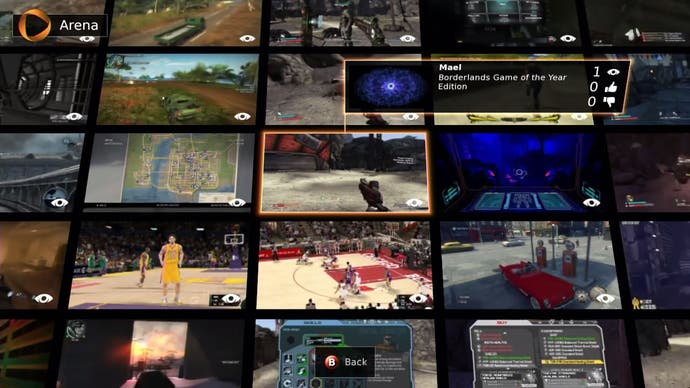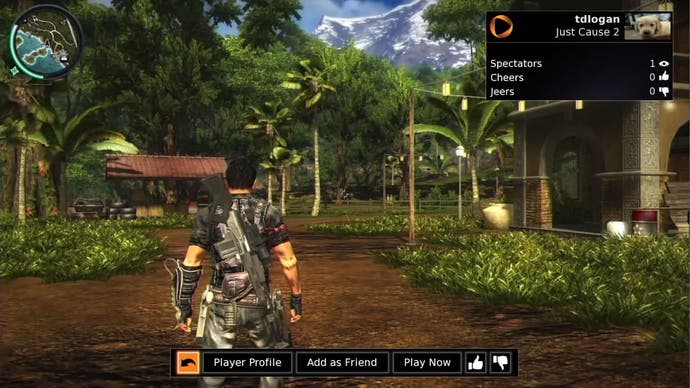OnLive Launches in the UK
We talk to CEO Steve Perlman about the game streaming service.
Well, we've been happily in discussions with everybody. Despite what you sometimes hear in the backchat, at the end of the day, the publishers are there to sell games, right? And they view us as a platform. And so, if the platform's selling and people are buying the games, well, they'll make their games available.
I think, more appropriately, they're more competitive with... the PC digital version, which is generally a little cheaper than the console version.
No. This is where we get into being a distributor... Although we have users, think of a user who's just coming in to demo a game, or who's just using this coupon. [He indicates a coupon for a free OnLive copy of Deus Ex that was shipped in the US PC retail version of the game.] Arguably, that's Square Enix's customer. So our agreements don't quite allow us to give aggregate data.
What we can say is that our chief operating officer's the COO of Pandora, which has had very rapid exponential growth. And that's what we're seeing right now. We've had weeks where the userbase has grown by five per cent.
What we found in the States, where there are bandwidth caps as well, is that we haven't really run into them. We tend to be very friendly with [ISPs], we work with them in trying to figure out ways to minimise congestion, rather than just trying to overload them. And they've mainly been going after folks who've been doing things like BitTorrent, where they've been gobbling up their upstream bandwidth, which is actually the most precious commodity, not the downstream. Our upstream bandwidth utilisation is very, very low. It's mostly the controller and status information about the channel.

The other thing is, BT, one of the things they're doing because they really want to encourage people to go and use OnLive, is that they're lifting caps for OnLive through the end of the year. So that's a good percentage of the UK population right there.
I think it's one of those things that will eventually wash away. Canada just ordered Rogers Cable to release their bandwidth caps. You know, if you looked at IP telephony a decade ago, it seemed like an extraordinary load on the internet, right? Today, it's a joke.
I think that our bandwidth is not going to increase; once you reach HDTV, you're there. So we don't need more bandwidth as the games get more complex. I think we'll have that covered.
We have it working in beta. The OnLive micro-console supports it.
You're talking about 10 megabits a second. What we've found, now that we've had a chance to test connections throughout the States, is that there's just not a large enough percentage of users out there yet to support it. There are some, we have some fibre, but cable systems generally won't allow connections that fast on a sustained basis. They actually will end up limiting you down to about 6 or 7 Mbps. Until we see that ceiling rise up there... It doesn't make sense when only five per cent of your users would have access.
Yeah. So for example, we could deliver movies at 1080p24, no problem. That's about 5 Mbps. 1080p60, that's a lot of bandwidth. I think what you'll see before that is 3D games, which would be 720p60, but in 3D - two views. 1080p60? The servers will do it, and the technology delivers it, it's no different than what we're doing today - it's just more bandwidth.
I don't expect so, the servers are the same cost to us, and the bandwidth keeps coming down for us, exponentially, in price. Remember, we're talking about a peak data rate of 10 Mbps, we don't always run at that rate. If the scene's not changing very much, we use a much lower data rate. If we could just get the networks to handle that peak, then we'd be OK. But they're just not set up for that right now.

It depends on the type of compression you're doing. We compress different types of games differently. Literally, when you go and play Borderlands, it's using a different compression algorithm than if you're playing Lego Harry Potter. The different algorithms favour different things.
We wish there were a silver bullet: one approach that would solve all problems, all games, all ISPs and all internet impairments. But we weren't able to find that.
If we see a game that does not perform well, then we work on it. We go and tune up the algorithm. The hardware that we have that does the compression in the data centre is programmable, and it's very, very flexible. We made it that way. it's the only way we could ever get this darn thing to work.
I wouldn't say there's any one particular [type of] game... The biggest thing you're going to see that happens in the next couple of years... is you're going to see the game pipelines changing to be more optimised to use state-of-the-art hardware. Right now, games are designed to be a little bit mushy, where they can work all the way from an Xbox 360 and PS3 through to a mid-range PC. Now you're going to see games move up to the very high end, knowing that that capability's always available - and then they can tune for things like latency and other characteristics.
Steve Perlman is the chief executive officer of OnLive. Thanks to Rich Leadbetter for his help with this interview.
